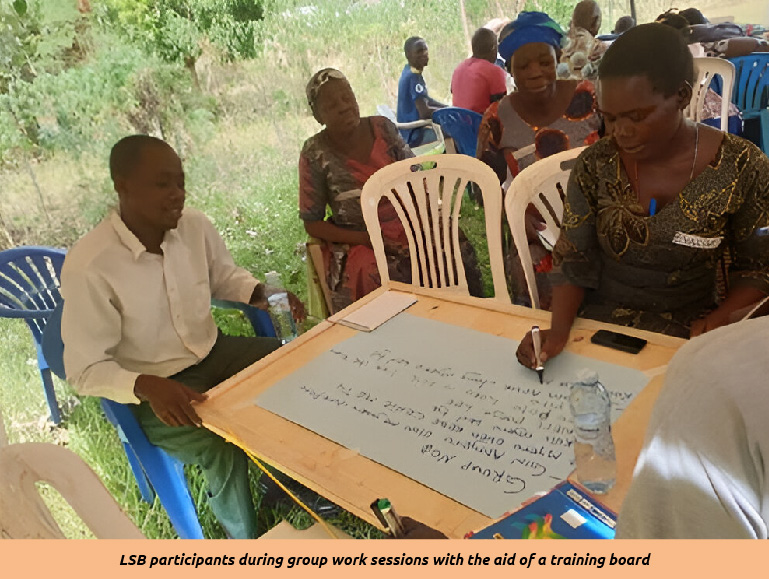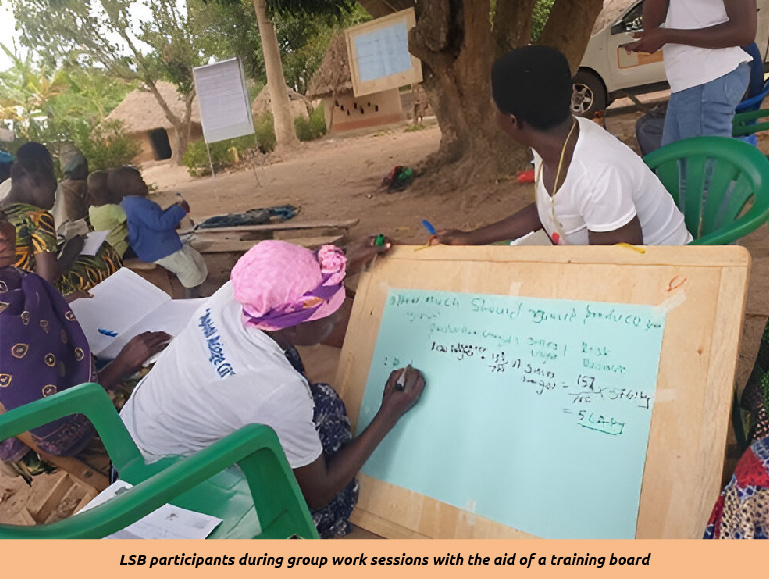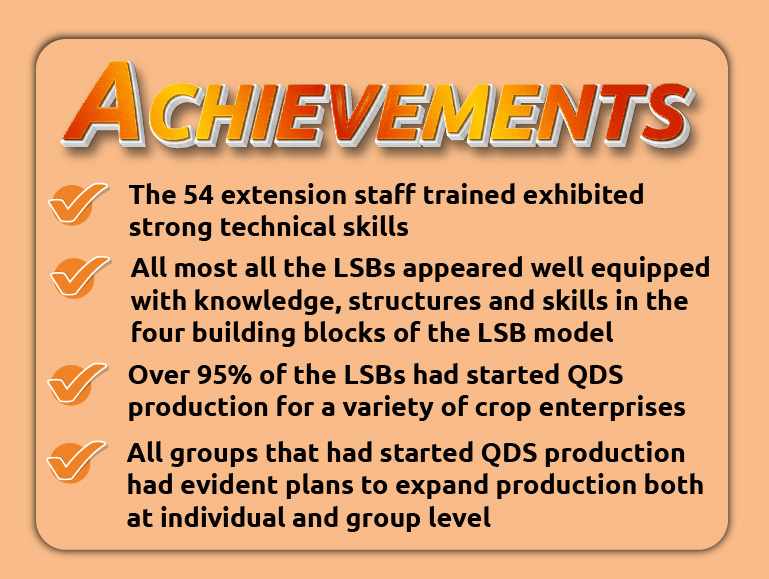Outscaling of the Local Seed Business beyond the ISSD Uganda projects
Uganda’s seed sub-sector ten years back
The inherent problem of the seed sector in Uganda has always been the limited level of access to and use of quality seed of improved crop varieties by smallholder farmers which is estimated to be no more than 20%. This percentage largely consists of seed for maize and sunflower hybrids and imported vegetable seed. There was evidently a large gap in availability of quality seed for important Open Pollinated Varieties (OPVs) of crops of legumes, oil seed, small cereals and roots and tubers commonly known as orphaned crops. These problems in Uganda’s seed sector resulted from limited; access to sufficient quantities of quality basic seed (early generation seed - EGS) as an input for quality seed production; access to affordable quality assurance services for quality seed growers; and at farmer uptake level, the insufficient awareness about the value of using quality seed.
The projects led to significant changes at regulatory level and at every node of the seed value chain. One of the most acclaimed innovations in Uganda seed sub-sector was the introduction of the farmer-led seed production system under which Quality Declared Seed (QDS) is produced and marketed through the Local Seed Business (LSB) model. By the end of the ISSD projects in 2021, a total of 250 LSBs had been established in 63 districts of the country. These farmer groups (LSBs) supplied quality seed of over 59 varieties of 14 major self-pollinating crops within rural farming communities in six agro-ecological zones in Uganda including; North, West Nile, South West, Western Highlands, South Western Highlands and East.
Scaling of LSB establishment over the projects’ period was implemented by 29 partners across all the six zones. These partners included private agro-enterprises, Non-Governmental Organisations (NGOs), Community Based Organisations (CBOs) and research institutes which were well placed to continuously offer remote support to LSBs even beyond the project period.
Through its PRUDEV programme, GIZ supported transformation of 18 farmer groups into Local Seed Businesses (LSBs) to produce and market quality declared seed (QDS) of various crop types and varieties in six districts of Northern Uganda. GIZ worked with World Vision Uganda as a local implementing partner to establish these LSBs in the districts of Lira, Oyam, Kitgum, Agago, Dokolo and Amolatar over the period 2021 and 2022.
At the end of 2022, GIZ contracted ISSD Uganda to strengthen capacity of the 18 newly formed LSBs to increase their chances of survival after the end of the PRUDEV programme. One of the key gaps which was identified through a diagnostic assessment of the 18 LSBs was the difficulty in accessing quality basic seed from research. Without Basic seed, it is impossible for a seed grower to produce quality seed.
Through joint action and collaboration with GIZ over a four months period, the LSBs indicated that they gained good knowledge from the coaching provided and they were more confident to continue with QDS production.
One of its sustainability strategies was the adoption of good agricultural practices (GAP), which includes the use of quality seed for increased production. The challenge of limited access to quality seed by smallholder farmers prompted NURI to pilot the QDS system which could be achieved through integration of the LSB model in their current activities. NURI embarked on supporting the development of 69 farmer groups into LSBs that can sustainably produce and market QDS. The farmer groups were selected from districts of Agago, Kitgum and Lamwo in Acholi sub region, and Arua, Madi-Okollo, Terego, Pakwach, Nebbi, Zombo, Koboko, Moyo, Obongi and Adjumani.
To facilitate this LSB establishment process, NURI awarded ISSD Uganda a consultancy to strengthen its technical team in the LSB model and the QDS system between the period of February and September 2023. This was to enable staff to effectively support the development of the selected farmer groups into sustainable LSBs. This objective was achieved through three main activities i.e.
a) Training of trainers for the NURI team of extension workers
b) Monitoring visits to each of the locations where NURI established LSBs
c) Provision of LSB development materials relevant to both the NURI extension workers and LSB farmers
The development of the digital STTS require a systematic and a regulatory framework to achieve the institutional embedding of the system development. For Uganda, the system is fully embedded in the Seed and Plant Regulations 2016 and the Seed and Plant (QDS) Regulations 2020. These two institutional frameworks provided directions and legal framework on which the digital STTS was developed.
The NOSP project plans to specifically stimulate LSBs to supply sufficient quantities of QDS to project farmers within their locations by;
1. Offering them capacity strengthening in production and marketing of QDS
2. Providing them with a subsidy to facilitate access to relevant inputs and equipment
3. Developing a network of NSCS-accredited private inspectors and labs
The third intervention in the seed value chain introduces a private sector-based inspection function to the seed sector as allowed by the Seed and Plant Regulations Act of 2017. This is an opportunity for the seed sub-sector to test a complementary approach to offering seed field inspection services considering that the current approach of utilizing the District Agricultural Officers is maimed by resource limitation.
Overall, it is important to note that LSB development is a slow process that calls for continued joint action and experience sharing to implement strategies that will ensure sustainability of the LSBs even beyond the various projects.




